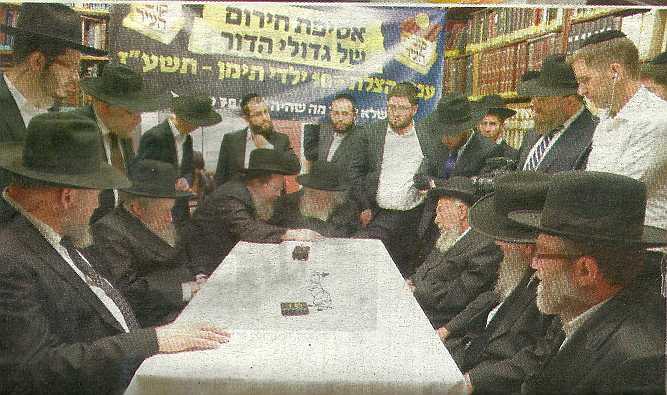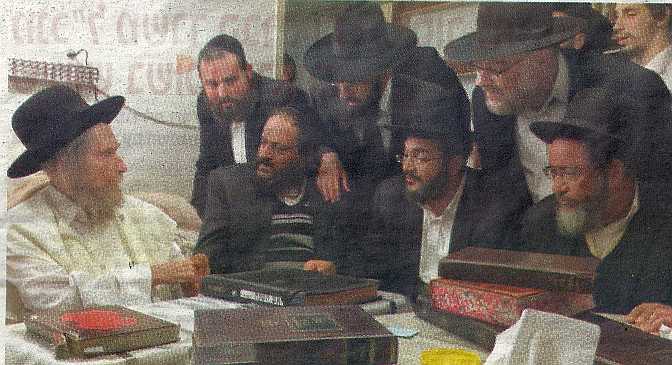Similar to the historic immigrants waves and like the smaller groups which were `dealt with' over the years, so the Jews of Raydah - the remnant of the Yemenite Jewish community - were brought up to Israel a year and a half ago through the Jewish Agency. Aside from a small group of forty elderly and ailing Jews, the entire historic settlement of Jews in Yemen thus came to an end.
 The emergency meeting at the home of HaRav Chaim Kanievsky
The emergency meeting at the home of HaRav Chaim Kanievsky
Sadly enough, when they arrived, they found that while the threat of Arab marauders had disappeared, new dangers, no less daunting, now faced these new immigrants: the danger of the young generation abandoning the path of their elders.
This danger came to the fore when upon arrival, the immigrants from Raydah were housed in an absorption center in Beer Sheva. The atmosphere there was outspokenly loose and secular, since they shared the premises with various groups of immigrants from different countries. The administration was totally secular.
The chareidi community tried to rise to the challenge and step in, especially Lev L'Achim.
"In spite of registration to chareidi educational institutions and ongoing shiurim for the men and the women established on the premises and delivered by outstanding chareidi bnei Torah, the temptation to the young children was tremendous," explains HaRav Sorotzkin director of Lev L'Achim. "These are young girls and boys who are living under the same roof, where the administration is bent on achieving full cultural integration of some 500 families in the absorption center who are totally secular. All of the social activities in the center are free, and are very tempting. Life in such an environment of mixed socializing and forbidden enticements is very dangerous.
"The place abounds with visual temptations [TV], outspokenly secular extracurricular activities and pronounced exposure to things completely foreign to the spirit of Torah. At this point, we understood that we should concentrate our efforts in saving these children so as not to reach a situation of a second edition of religious obliteration of Yemenite Jewry. A concerted effort beyond what Yad L'Achim is doing already on the premises was called for."
Discussing the issue with HaRav Shteinman

Taking counsel from HaRav Aviezer Piltz, Rosh Yeshivas Tifrach, who mobilized himself personally to this cause, as being the rav of the closest city, it was decided by the activists of Yad L'Achim and with the coordination of the Southern Region, R' Tuvya Levinstein, to involve the Bnei Brak based but country wide Kupat Ha'ir fund in the matter, outlining the grave spiritual danger in leaving these immigrants in that absorption center.
Kupat Ha'ir plunged into the effort and it eventually became clear to all involved that the only solution was to arrange for (i.e. buy) permanent housing for the families in the absorption center so that they could leave and form their own community. The cheapest possibility that was found, requires, after all the assistance that is available to new immigrants, the addition of about $60,000 per family. Part of the reason for this is that it was determined that the small Yemenite community must be located near an established chareidi community, as remote (and cheap) as might be found.
Kupat Ha'ir is working with each family to determine what is right for them and what they can contribute. However their estimate at this time is that they will need a total of about NIS 4 million ($1.1 million).
"We have a chance to act to save something we lost more than 60 years ago, at the time of mass Yemenite immigration," said HaRav Aviezer Piltz at an emergency meeting at the home of HaRav Chaim Kanievsky (see photo). HaRav Dov Lando and HaRav Shimon Baadani were also at the meeting. "They we were small and poor. Now we must see to it that we can say unequivocally that our hands did not shed this blood, by coming to the aid of this precious community."
"There are no greater orphans than these," said HaRav Chaim Kanievsky. "Certainly whoever helps this well have children who are tzadikim, middah keneged midda.




